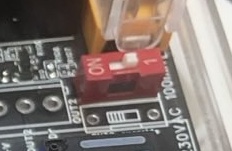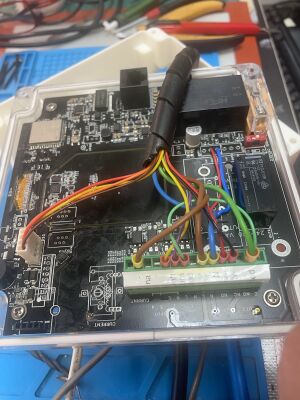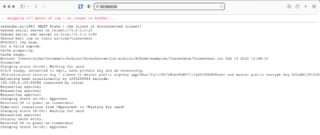Node Tussendeur: verschil tussen versies
| Regel 70: | Regel 70: | ||
= Resetting the Node = | = Resetting the Node = | ||
Unplug the ethernet cable in the main patch cabinet. | Unplug the ethernet cable in the main patch cabinet. See [[Network setup overview|this page for details]]. | ||
Wait | Wait at least 60 seconds until you try again (the ESP32 is quite slow & it needs to create some cryptographic date before it can start communicating over https/SSL). | ||
= Electronics = | = Electronics = | ||
Versie van 1 dec 2024 17:58
PoE powered Node on Ethernet voor de tussendeur in de hal.
Current IP address: 192.168.6.30 / 30:AE:A4:13:E9:3C and connected to port 2 of the patch panel
Has debugging on telnet, MQTT, syslog and a web interface: http://192.168.6.30:
Electronics
Mosfet om een Solenoide in de deur aan te sturen. Deze draait op de 48V van de PoE.
Runs on the PowerNodeV11 board. It has a separate splitter to extract a higher voltage/current (12V) for the solenoid.
New version
| IP address | ????? |
| hardware ethernet | 08:D1:F9:90:B3:6 (wired) |
| Logging | telnet, serial, http, mqtt, syslog |
Normal operation
Swipe your card - node should beeb for 4 seconds; or give a short intermittent deny signal.
Bypassing the node

With the explicit permission from a trustee - a node can be bypassed. For example when it is broken. There is a red dip switch on the back of the board; near the AC/DC transformer and the fuse.
Placing it in the 'on' position will bypass the node (i.e. to the left in the picture); and provided power to the solenoid.
Obviously - doing so without the express permission is a sure way to loose your membership.
Trouble Shooting
Check what is on the display. The first QR code will bring you to this page. The second QR code will show you the logs in a browser. You can also telnet to the IP address shown in the 'MORE' display to see the log in real time.
See this page for more details.
Swipe ok - but does not want to open door
- Do you see waiting for card on the display ? If so - it has not read your card (yet).
- Did you hear one or more beebs when you swiped ? If so - your card is picked up ok ?
If you hear beebs:
- Did you hear 3 or more beeps when you swiped ? If so - your card is not getting permission from the system.
- Does your personal page in mijn.makerspaceleiden.nl show that you have permission ?
- Did you get your permissions quite recently ?
- Is the internet in the space up and running (as it only periodically updates its database).
The Machine does not want to accept my badge
- Do you hear a beeb when swiping ? If so - it has read your card -- and see above issues.
If it did not beeb:
- Did it work on the door ?
- Does it work on any other machine ?
If so - your badge is fine - but we may have a broken ACNode or a broken reader. Report this to the mailing list - or if you know a little of IT and electronics - go to the troubleshooting section and connect to the log via your webbrowser or via telnet. Then swipe again and see what really happens.
Note that we are, at this time, not sure if these nodes will survive the welding area.
Resetting the Node
Unplug the ethernet cable in the main patch cabinet. See this page for details.
Wait at least 60 seconds until you try again (the ESP32 is quite slow & it needs to create some cryptographic date before it can start communicating over https/SSL).
Electronics
De node is PoE powered; set to 12 Volt.
Board jumpers and settings
Board 5
- Rework 1 - verwijderen ESD diodes antenne
- Rework 2 - omdraaien transistors programmering
- 0-ohm (jumpering) R109 removed; 5V of USB not connected to 5V rail.
- Fixed 5v resistor replaced by potentionmeter; and set to 12volt
Jumpers:
- Vpoe - Slow Start
- Vpoe5 - Slow Start
- Vpwr - Vpoe as source
- 5V- Vpoe5 as source
- Out2 - via AC jumpers
- AC jumpers wired to 12volt via two wires.
Special Wiring
The 12 volt DC of VPoe is wired to L/N of the normal 220V AC input. So that the C/NO of relay 2 is a simple 12 volt on/off.
Connectors
Green Connector

| PIN | Description | Use |
|---|---|---|
| 1 | CUR2 | NC |
| 2 | CUR2 | NC |
| 3 | OPTO 4 | NC |
| 4 | OPTO 3 | NC |
| 5 | OPTO 2 | NC |
| 6 | OPTO 2 | NC |
| 7 | OPTO 1 | NC |
| 8 | OPTO 1 | NC |
| 9 | L input | L; 12 Volt out |
| 10 | N input | N; GND |
| 11 | Relay 1 NO | NC |
| 12 | Relay 1 Common | NC |
| 13 | Relay 1 NC | NA |
| 14 | Relay 1 NC | 12 volt to solenoid |
| 15 | Relay 1 common | 12 volt from solenoid |
Source code
https://github.com/MakerSpaceLeiden/AccessSystem/lib-arduino/ACNode/examples/TussendeurNode
Bill of material
| Back v1.11 node board | ~35 |
| ESP32 | ~3.50 |
| Big green Connector | ~1.50€ |
| RJ45 connector | ~0.10 |
| Solenoid 12V | ~39€ |
| OLED display | ~3.50€ |
| Buttons x3 | ~0.30€ |
| 12v coil relay; switch 240ACV/3A | free, donated to MSL |
| 4 long bolts | 0.80 € |
History
Rebuild sometime 2016 and upgraded early 2018 with the 1.1 batch (yellow boards)
Firmware last updated 2022/2/19 with https://github.com/MakerSpaceLeiden/AccesSystem/releases/tag/cache-fix-2022-02-19-1.00 - to fix caching and a range of errors found by Duco when using the Arduino rather than the VisualStudio setup.
Replaced 2024-12-01 by a the black variation of PowerNode White
